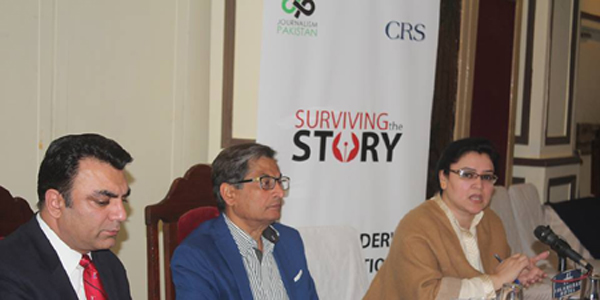CRS and JournalismPakistan.com kick off project to study economic security of slain journalists' families
JournalismPakistan.com | Published: 23 February 2017
Join our WhatsApp channel
Communication Research Strategies and JournalismPakistan.com have initiated a project to investigate the economic challenges faced by families of slain journalists. The project aims to gather insights from various stakeholders to develop relevant policy recommendations.Summary
ISLAMABAD - Communication Research Strategies (CRS) and JournalismPakistan.com Wednesday kicked off a project focusing on economic security of slain journalists’ families or those displaced, by holding a consultation with stakeholders.
The project titled ‘Surviving the Story’ involves conducting a research on the issue in Khyber Pakhtunkhwa as a pilot, engage in consultations with media practitioners and other stakeholders and come up with policy recommendations.
Senior journalists from Islamabad and Peshawar, representatives of unions including Pakistan Federal Union of Journalists (PFUJ), Khyber Union of Journalists, Rawalpindi-Islamabad Union of Journalists, Pakistan Press Council, press clubs, NGOs and others took part in the consultation.
The participants expressed dismay over government’s dilly-dallying in addressing issues of journalists’ safety and economic security while also pointing out the media needed to put their own house in order.
Aniq Zafar, CEO of CRS said although a lot of focus has been on physical security of media persons in years past, the issue of economic security however, has remained largely unaddressed.
Representing JournalismPakistan.com, Myra Imran pointed out no one has ever tried to ascertain how families of slain journalists cope, and if ever compensations announced were enough, and if at all they had landed in the right hands.
Quoting figures released by national and international media watchdogs, she said between 2000 and 2016, 105 journalists were killed, among them 80 target killed and 25 losing their lives in suicide attacks and bombing.
Nasir Zaidi, member of Pakistan Press Council (PPC) and a press freedom activist said the state of journalism was in pathetic condition today. “There are 25000 working journalists in Pakistan and out of them only 1500 to 2000 are regular employees with the rest being contractual,” he disclosed.
He also drew attention towards the brain-drain in journalism. “Disheartened by the existing state of affairs, competent journalists are leaving the profession. The editor’s role has become minimal as managing directors and directors call the shots.”
Afzal Butt, President Rawalpindi-Islamabad Union of Journalists (RIUJ), said no support has been forthcoming from the government when it comes to providing protection to journalists, both physical and economic.
He suggested it would be good if the government told PEMRA to include a clause for license holders to declare if they had paid salaries to their staff on time throughout the year. Similarly, Press Information Department (PID) could be told to do the same for newspapers.
Detailing why journalists murderers were hardly ever arrested, Butt pointed to FIRs being weak and victims’ families not having the money to pursue investigations and deal with the police where bribery is a norm.
Saiful Islam Saifi, President of Khyber Union of Journalists (KhUJ) said journalists’ economic security was at the heart of all issues. Any legislation on physical and financial security of media persons must have involvement of all stakeholders right till the end.
He said issues facing media in Khyber Pakhtunkhwa and FATA were different and therefore had to be dealt with differently.
The participants were unanimous in pointing out that PFUJ, currently in a deep split, must be strengthened. “Today this union has a big responsibility on its shoulders and that is to bring unity within its ranks,” Nasir Zaidi said.
Media analyst Adnan Rehmat focused on the three Ps – Policy (what is the consensus), Procedure (what mechanism exists), and Practice (making use of laws that exist).
Rehmat regretted the government had no mechanism to provide protection and support to journalists. Similarly, media owners also had no mechanism in place and no safety protocols.
He called for teaming up with Pakistan Journalists Safety Fund, a volunteer organization that has extended help to several journalists in the past.
Rehmat drew attention of the house to the definition of a journalist in the proposed Media Safety Bill that may not include media workers like a driver of DSNG, or engineer.
Shakeel Anjum, President National Press Club, thought the government was not serious in addressing issues the journalist fraternity faces. He said it was time to be practical and the unions and press clubs needed to compile accurate data on families of journalists killed and extend as much help to them as possible.
Faisal Rehman moderated the consultation.
KEY POINTS:
- The project is titled 'Surviving the Story' and focuses on slain journalists' families.
- Stakeholders include media practitioners and unions discussing safety and economic issues.
- Participants emphasized the urgent need for government action on journalists' protection.
- Economic and physical security of journalists remains inadequately addressed.
- The consultation highlighted the existing challenges and proposed actions for improvement.

























